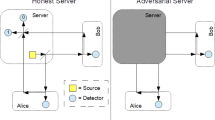Abstract
Recently, Hwang et al. proposed two three-party authenticated quantum key distribution protocols for two communicating parties to establish a session key via a trusted center. They also showed their protocols were secure by using random oracle model. However, their protocols were designed to run in an ideal world. In this paper, we present a more practical protocol by considering some issues, which have not been addressed in their protocols. These issues include (1) session key consistence, (2) online guessing attack, and (3) noise in quantum channels. To deal with these issues, we use error correction code and key evolution. We also give a formal proof for the security of our protocols by using standard reduction, instead of the random oracle model.




Similar content being viewed by others
References
Bennett, C.H.: Quantum cryptography using any two nonorthogonal states. Phys. Rev. Lett. 68(21), 3121 (1992)
Bennett, C.H., Bessette, F., Brassard, G., Salvail, L., Smolin, J.: Experimental quantum cryptography. J. Cryptol. 5(1), 3 (1992)
Bennett, C.H., Brassard, G.: Quantum cryptography: Public key distribution and coin tossing. In: Proceedings of the IEEE International Conference on Computers, Systems and Signal Processing, p. 175 (1984)
Ekert, A.K.: Quantum cryptography based on Bell’s theorem. Phys. Rev. Lett. 67(6), 661 (1991)
Biham, E., Boyer, M., Boykin, P.O., Mor, T., Roychowdhury, V.: A proof of the security of quantum key distribution. J. Cryptol. 19(4), 318 (2006)
Biham, E., Boyer, M., Brassard, G., van de Graaf, J., Mor, T.: Security of quantum key distribution against all collective attacks. Algorithmica 34(4), 372 (2002)
Biham, E., Mor, T.: Security of quantum cryptography against collective attacks. Phys. Rev. Lett. 78(11), 2256 (1996)
Biham, E., Mor, T.: Bounds on information and the security of quantum cryptography. Phys. Rev. Lett. 79(20), 4034 (1997)
Inamori, H., Lütkenhaus, N., Mayers, D.: Unconditional security of practical quantum key distribution. Eur. Phys. J. D Atom. Mol. Opt. Plasma Phys. 41(3), 599 (2007)
Lo, H.K., Chau, H.F.: Unconditional security of quantum key distribution over arbitrarily long distances. Science 283(5410), 2050 (1999). http://www.arxiv.org/abs/quant-ph/9803006
Mayers, D.: Unconditional security in quantum cryptography. J. ACM 48(3), 351 (2001)
Shor, P.W., Preskill, J.: Simple proof of security of BB84 quantum key distribution protocol. Phys. Rev. Lett. 85, 441 (2000). http://www.arxiv.org/abs/quant-ph/0003004
Wegman, M.N., Carter, J.L.: New hash functions and their use in authentication and set equality. J. Comput. Syst. Sci. 22, 265 (1981)
Hwang, T., Lee, K.C., Li, C.M.: Provably secure three-party authenticated quantum key distribution protocols. IEEE Trans. Dependable Secure Comput. 4(1), 71 (2007)
Colbeck, R.: The impossibility of secure two-party classical computation. Phys. Rev. A 76(6), 062308 (2007)
Lo, H.K.: Insecurity of quantum secure computations. Phys. Rev. A 56(2), 1154 (1997)
Salvail, L., Schaffner, C., Sotakova, M.: On the power of two-party quantum cryptography. In: Advances in Cryptology: Proceedings of Asiacrypt 2009, pp. 70–87. Springer, Berlin (2009)
Canetti, R., Goldreich, O., Halevi, S.: On the random-oracle methodology as applied to length-restricted signature schemes. In: Proceedings of the 1st Theory of Cryptography Conference (TCC’04), pp. 40–57. Springer, Berlin (2004)
Canetti, R., Goldreich, O., Halevi, S.: The random oracle methodology, revisited. J. ACM 51(4), 557 (2004)
Guan, D.J., Wang, Y.J., Zhuang, E.S.: Quantum key evolution and its applications. Int. J. Quantum Inf. 10(4), 1250044 (2012); 16 pp
Calderbank, A.R., Shor, P.W.: Good quantum error-correcting codes exist. Phys. Rev. A 54, 1098 (1996). http://www.arxiv.org/abs/quant-ph/9512032
Steane, A.M.: Error correcting codes in quantum theory. Phys. Rev. Lett. 77, 793 (1996)
Bennett, C.H., Brassard, G., Robert, J.M.: Privacy amplification by public discussion. SIAM J. Comput. 17(2), 210 (1988)
Bennett, C.H., Brassard, G., Crépeau, C., Maurer, U.M.: Generalized privacy amplification. IEEE T. Inform. Theory 41(6), 1915 (1995)
Schwinger, J.: Unitary operator bases. Proc. Natl. Acad. Sci. USA 46(4), 570 (1960)
Carter, J.L., Wegman, M.N.: Universal classes of hash functions. J. Comput. Syst. Sci. 18(2), 143 (1979)
Renner, R., König, R.: Universally composable privacy amplification against quantum adversaries. In: Kilian, J. (ed.) Theory of Cryptography. Lecture Notes in Computer Science, vol. 3378, pp. 407–425. Springer, Berlin (2005)
Gisin, N., Ribordy, G., Tittel, W., Zbinden, H.: Quantum cryptography. Rev. Mod. Phys. 74(1), 145 (2002)
Hwang, W.Y., Ahn, D.D., Hwang, S.W.: Eavesdropper’s optimal information in variations of Bennett-Brassard 1984 quantum key distribution in the coherent attacks. Phys. Lett. A 279(3–4), 133 (2001)
Hwang, W.Y., Koh, I.G., Han, Y.D.: Quantum cryptography without public announcement of bases. Phys. Lett. A 244(6), 489 (1998)
Acknowledgments
The authors would like to thank the anonymous reviewers for their valuable comments and suggestions to improve the quality of the paper. This work was supported in part by the National Science Council, Taiwan, under Contract NSC100-2219-E-110-004, NSC101-2219-E-110-004, and NSC102-2219-E-110-003.
Author information
Authors and Affiliations
Corresponding author
Rights and permissions
About this article
Cite this article
Guan, D.J., Wang, YJ. & Zhuang, E.S. A practical protocol for three-party authenticated quantum key distribution. Quantum Inf Process 13, 2355–2374 (2014). https://doi.org/10.1007/s11128-014-0767-1
Received:
Accepted:
Published:
Issue Date:
DOI: https://doi.org/10.1007/s11128-014-0767-1




